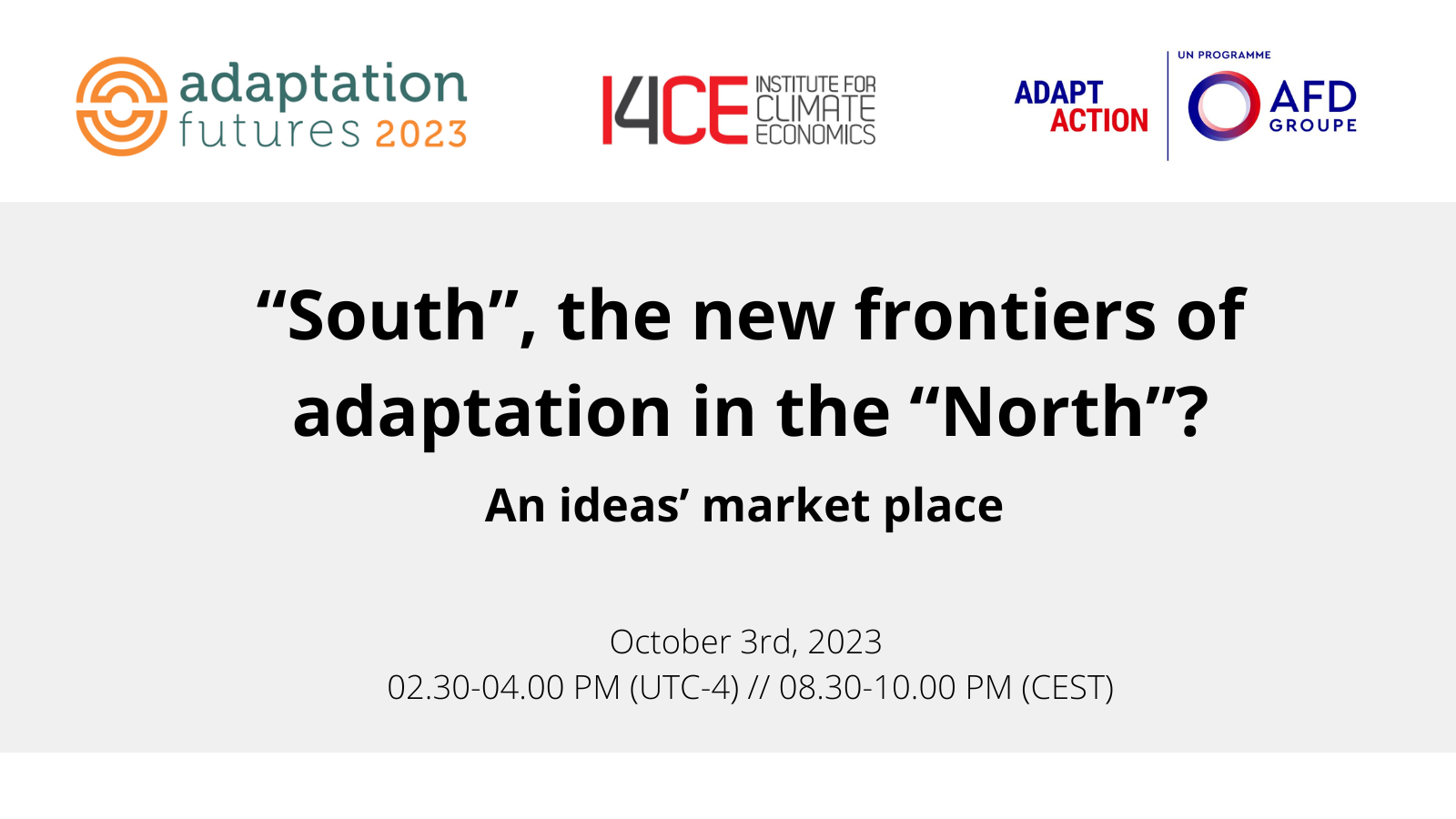“South”, the new frontiers of adaptation in the “North”?
Webinars - By : Vivian DEPOUES, PhDAn ideas’ market place with Adapt’Action‘s program from AFD

I4CE at Adaptation Futures 2023 (October 2-6, 2023)
Held every two years, Adaptation Futures is the leading international conference dedicated to adaptation to climate change. It brings together researchers, decision-makers, practitioners and companies working on adaptation from all over the world. In 2023, the United Nations Environment Programme (UNEP), in partnership with Ouranos and the Government of Canada, organized the 7th edition in Montreal.
I4CE was present throughout the week, with two highlights co-organized with our partners:
- the 2023 adaptation finance gap update and emerging lessons and best practice on how to bridge the gap: see more informations about this event;
- “South”, the new frontiers of adaptation in the “North”?
Date : October 3rd, 2023
Time: 02.30-04.00 PM (UTC-4) // 08.30-10.00 PM (CEST)
Format : in person and online
Partners: Adapt’Action de l’AFD
Description of the event
Adaptation is often framed as a North-South stream of capacities (finance, human resources, knowledge) flowing through Development Aid framework or through dedicated UNFCCC-related structures such as the Adaptation Fund or the Green Climate Fund.
Of course, efforts are still needed to meet financial commitments and adaptation costs (cf. UNEP adaptation gap report 2022), and to improve research funding that is unequally deployed, especially as regards Africa (Trisos, Adelekan, Totin et al., 2022; Overland et 2021).
However, Global South as actors in the frontline of adaptation have advanced their capacity to adapt beyond that of countries in the Global North. As an example, Bangladesh epitomizes such an incongruity, by being both one of the most vulnerable and one of the most advanced countries in adaptation. South-South experience sharing is also fast growing (e.g. through LUCCC, LEG, PAS-PNA, LDC Group, etc.), although challenges to overcome language barriers remain (e.g. for francophone Africa).
Conversely, this session aimed at exploring a different stream of knowledge and experience, from “South” to “North”. It is based on the assumptions that:
- the experience gained by developing countries can offer a wealth of adaptation knowledge in developed countries, whether it be in terms of framing or in terms of potential solutions;
- a South-North stream of knowledge can be mutually beneficial and needs to be strengthened;
- specific organisational arrangements should be explored to foster this dialogue.
This session was tackle the following questions:
- what are the previous experiences in terms of the South-North knowledge stream related to adaptation?
- what topics or tools would be the most relevant to share in priority (e.g. hard limits of adaptation, participation and inclusiveness, a specific sector, etc.);
- what would be the most effective format to share this kind of experience between representatives of “South” and representatives of “North”?
- how to make this knowledge sharing actionable?
I4CE co-organized this session in partnership with Agence Française de Développement (AFD), as part of its participation in the AFD’s Adapt’Action program monitoring committee. This is an opportunity to enrich the analyses carried out in Europe, and to enhance the sharing of knowledge and methodologies with a wide range of partners and international organizations.
Speakers:
- Lisa Schipper (University of Bonn) ;
- Christophe Buffet et Imane Bourkane (AFD, Adapt’Action) ;
- Vivian Dépoues (I4CE) ;
- Arame Tall (World Bank ) ;
- Saleemul Huq (International Centre for Climate Change and Development – ICCCAD).
